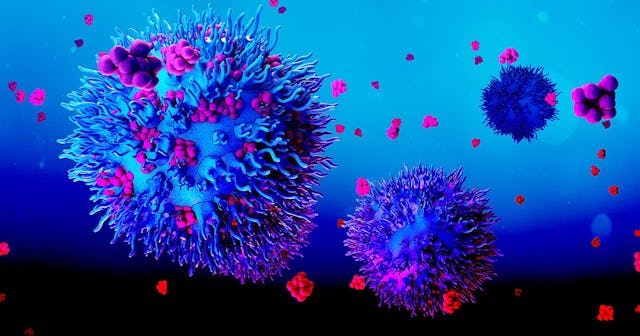The Role T-Cells May Play In COVID-19 Immunity

COVID-19 is terrifying. The possibility that I could get infected by a virus that would make it impossible to take care of my children for weeks and months on end, or that I could contract the virus and not survive thereby leaving them orphans, is horrifying. The idea that I might unknowingly pass the virus to someone who gets viciously ill makes me heartsick. And the reality that we have to live through a pandemic with no end in sight is too stressful to really put into words.
Which is why I’m always on the hunt for the next reason to hope. That a vaccine is on the horizon. That some truth about the virus will be revealed that allows us to understand who gets sick and why, and gives us the tools to treat them. That things—all the things—will begin to turn around.
My latest hope: all the research coming out about the role of T-cells and immunity.
When Kings College London reported findings of a study that antibodies to COVID-19 might fade two to three months after infection, my stomach knotted up. Granted, my understanding of antibodies and immunity is basic, but that couldn’t be good news—not for hopes of a vaccine or hopes that re-infection, at least in the short term, is unlikely.
But within the last few weeks, the word T-cell has been popping up more and more in discussions about immunity.
In an interview with The Atlantic, Eric Topol, a cardiologist and the founder and director of the Scripps Research facility, stated that, “To look at just one part of the immune response is woefully incomplete, especially if many COVID patients rely more on T cells.”
At first, discussions of T-cells only appeared in passing, but as our understanding of this horrific virus grows, the scientific community seems to be paying more attention to T-cells, and writing about these T-cells with a touch more optimism. Which means that, for better or worse, my hopes are soaring.
What Are T-Cells?
Without digging too much into the science—because, to be honest, I have trouble keeping it all straight, T-cells are an essential part of the adaptive immune system. They are created in the bone marrow and mature in the thymus where they multiply and differentiate into distinct roles as helper, regulatory, or cytotoxic T-cells.
Encyclopedia Brittanica explains: “Once stimulated by the appropriate antigen, helper T cells secrete chemical messengers called cytokines, which stimulate the differentiation of B cells into plasma cells (antibody-producing cells). Regulatory T cells act to control immune reactions, hence their name. Cytotoxic T cells, which are activated by various cytokines, bind to and kill infected cells and cancer cells.”
After the infection, the body stores the T and B cells it created to fight off a virus in case it needs them in the future. These stored cells are called memory cells and they make up the core of long-term immunity.
T-Cells And COVID-19 Immunity
serts/Getty
The news that levels of antibodies may decline after just two or three months was discouraging, but digging deeper into that finding, it turns out that it’s not uncommon for antibody responses to wane after an infection. For a regular cold, the antibodies the body produces last for about a year, while for other diseases, like measles, those antibodies last for a lifetime. But a waning antibody count does not mean waning immunity, according to a piece published in the New York Times written by Doctors Akiko Iwasaki and Ruslan Medzhitov, professors of immunology at Yale. They theorize that even if antibodies subside, “[t]he memory B cells that first produced those antibodies are still around, and standing ready to churn out new batches of antibodies on demand.”
Which means the blueprint to fight the virus may still be there, even if the antibodies are not. That’s encouraging not only on an individual level for those who had the virus and then ultimately tested negative for antibodies, but also for that ultimate hope: an effective, protective vaccine.
Some studies are also finding that some people who fight off the virus never develop antibodies, thanks to a virus specific T-cell response. In an interview with CNN, Dr. Arturo Casadevall, chair of the department of molecular microbiology and immunology at the Johns Hopkins School of Public Health, said he believes “some of the asymptomatic people may be able to rapidly clear the virus thanks to this T-cell reactivity.”
Again, these findings and theories are exciting on an individual level–there’s something comforting in knowing maybe many of us have a mechanism in place to fight this virus–but also on a societal level. The more we understand immunity, the better the vaccine we can develop.
Realistically, research regarding T-cells won’t make a difference to our day-to-day. Not only is it too difficult to easily mass test the population for T-cell reactivity, but there’s not enough yet known about T-cells to guarantee that anyone has any kind of protection. Masks, social distancing, staying home as much as possible are still the best and only strategies we have for fighting this virus until a vaccine becomes available.
But understanding the role of T-cells against COVID-19 might help us understand immunity and might speed up the process of developing an effective, safe vaccine. It might help us understand why some people get sick while others remain asymptomatic. Maybe, somehow, the research regarding T-cells will be the key to answering the endless questions that seem to follow this virus, and we can finally unlock a little peace after months of tumult. I hope so, anyway.
This article was originally published on